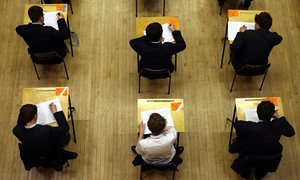
While the overall A-level results for England, Wales and Northern Ireland were stable, the share of entries winning A* and A grades subsided for the fifth consecutive exam season, the Guardian reported.
Some 25.8 percent were awarded As and above, compared with 27 percent in 2010, the first year that the highest A* grade was introduced.
But the headline pass rate among all grades from A* to G remained unchanged at 98.1 percent , thanks to government policy that fixes pass rates to previous results achieved by the same year group.
Northern Ireland and the southeast of England were the standout areas, with 29 percent of entries gaining top grades, while London entrants gained 27.4 percent. The lowest performances came in the northeast of England, despite improved results, while Wales endured its weakest results since 2002.
Among state schools that were celebrating success was Cardinal Newman college, a Catholic sixth-form college in Lancashire with eight pupils accepted to Cambridge. The pupils had taken part in the university’s outreach program targeting high-achieving state school students.
The results achieved by the college’s sixth formers included four A*s and an A for Sameeullah Shahabi, who will now go on to study medicine.
“The staff and students at Cardinal Newman never fail to impress me with their hard work and it has certainly paid off in spades this year,” said Nick Burnham, the college’s principal.
Traditional exam hothouses continued to excel: Close to 56 percent of entries at Westminster school in London gained A*s, the best result in the school’s history.
But the stable results masked a small but surprising shift away from the types of academic subjects favored by universities ― the so-called ‘facilitating subjects’, including English ― reversing a trend of recent years.
Arts subjects such as drama and music tumbled in terms of entries, and English was down five percent. But it was the steep decline in entries for French, down by 6.5 percent on the year, as well as German and Spanish, that set off alarm bells over the poor state of language teaching and take-up in Britain’s schools.
Russell Hobby, general secretary of the National Association of Head Teachers, called for a national strategy to address the decline, while a spokesperson for the Russell Group universities warned: “If the UK is to engage fully with the wider world in business, diplomacy and academia we need more young people studying languages.”
Vicky Gough, schools adviser at the British Council, welcomed the small increase in numbers studying the likes of Japanese and Arabic, but added: “It is worrying that the more traditional languages have suffered a downturn.
“The reality is that language-learning matters to the UK now more than ever. Not only do language skills boost job prospects but as one of the first opportunities that our young people have to connect with another culture, they are vital for the country’s place in the world too.”
On a more positive note, the percentage of students getting A*s in modern foreign languages has gone up, after an investigation into why languages appear to attract harsher marking than other subjects.
Schools Minister Nick Gibb said he expected the uptake of languages to increase. “There has been a slight decline in modern foreign languages but the introduction of the EBacc has arrested the historic fall of foreign languages at GCSE and we expect this will grow the pool of young people who are equipped to go on to study languages at A-level.”
Among science and technology subjects, the Institution of Engineering and Technology flagged up falls in the number of students taking the engineering gateway subjects ― maths, physics and design and technology (DT) ― as harming economic growth if the UK did not produce more engineers.
“If we don’t reverse this trend, thousands of young people are effectively closing the door on an exciting, creative career as engineers. We are also at risk of stifling economic growth if we do not produce the future engineers we so critically need,” said Prof. Will Stewart of the IET.

Add new comment